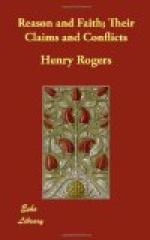* (Pp. 51—60.) We are hardly likely to yield to Mr. Foxton in our love of Plato, for whom we have expressed, and that very recently, (April, 1848,) no stinted admiration: and what we have there affirmed we are by no means disposed to retract,—that no ancient author has approached, in the expression of ethical truth, so near to the maxims and sometimes the very expressions, of the Gospel. Nevertheless, we as strongly affirm, that he who contrasts (whatever the occasional sublimity of expression) the faltering and often sceptical tone of Plato on religious subjects, with the uniformity and decision of the Evangelical system,—his dark notions in relation to God (candidly confessed) with the glorious recognition of Him in the Gospel as ’our Father,’—his utterly absurd application of his general principles of morals, in his most Utopian of all Republics, with the broad, plain social ethics of Christianity,—the tone of mournful familiarity (whatever his personal immunity) in which he too often speaks of the saddest pollutions that ever degraded humanity, with the spotless purity of the Christian rule of life,—the hesitating, speculative tone of the Master of the Academy with the decision and majesty of Him who ’spake with authority, and not as the Scribes,’ whether Greek or Jewish.—the metaphysical and abstract character of Plato’s reasonings with the severely practical character of Christ’s,—the feebleness of the motives supplied by the abstractions of the one, and the intensity of those supplied by the other,—the adaptation of the one to the intelligent only, and the adaptation of the other to universal humanity,—the very manner of Plato, his gorgeous style, with the still more impressive simplicity of the Great Teacher,—must surely see in the contrast every indication, to say nothing of the utter gratuitousness (historically) of the contrary hypothesis, that the sublime ethics of the Gospel, whether we regard substance, or manner, or, tone, or style, are no plagiarism from Plato. As for the man who can hold such a notion, he must certainly be very ignorant either of Plate or of Christ. As the best apology for Mr. Foxton’s offensive folly we may, perhaps, charitably hope that he is nearly ignorant of both.—Equally absurd is the attempt to identify the metaphysical dreams of Plato with the doctrinal system of the Gospel, though it is quite true, that long subsequent to Christ the Platonising Christians tried to accommodate the speculations of the sage they loved, to the doctrines of a still greater master. But Plato never extorted from his friends stronger eulogies than Christ has often extorted from his enemies.
____
It is amazing and amusing to see with what case Mr. Foxton decides points which have filled folios of controversy. ’In the teaching of Christ himself, there is not the slightest allusion to the modern evangelical notion of an atonement.’ ’The diversities of “gifts” to which Paul alludes, Cor. i. 12. are nothing more than those different “gifts” which, in common parlance, we attribute to the various tempers and talents of men.’ (P. 67.) ’It is, however, after all, absurd to suppose that the miracles of the Scriptures are subjects of actual belief; either to the vulgar or the learned.’ (P. 104.) What an easy time of it must such an all-sufficient controvertist have!




